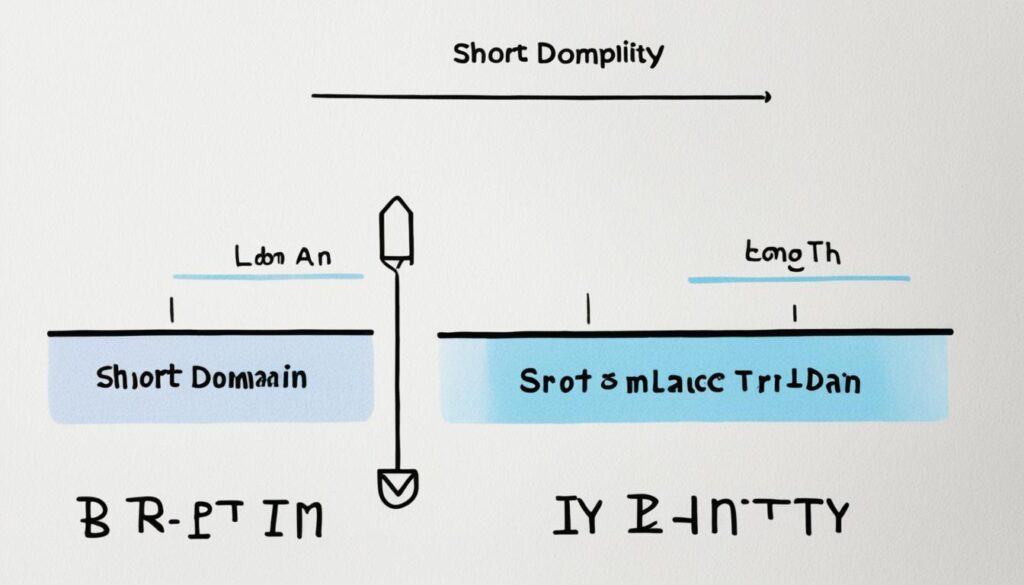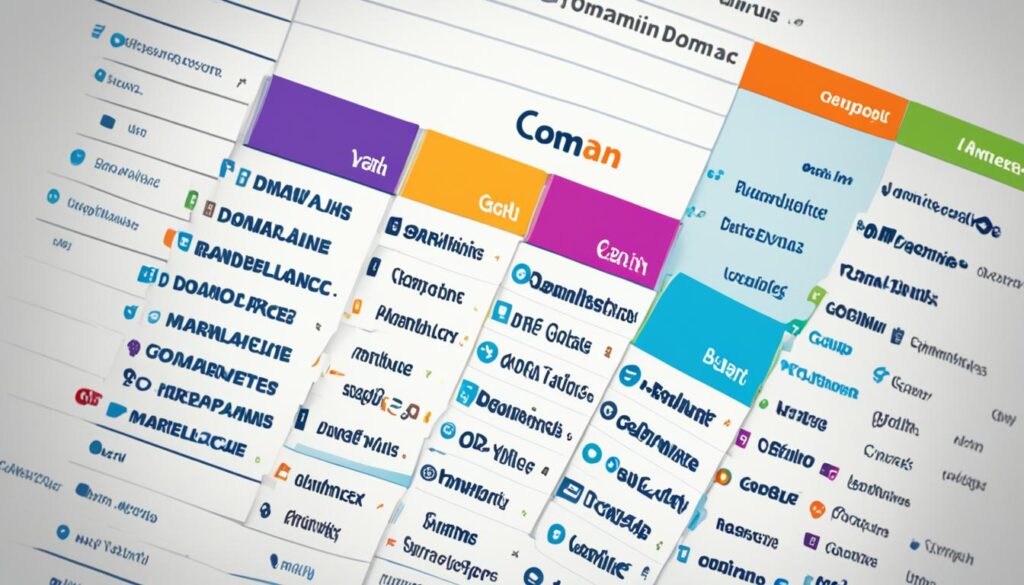There are several factors to think about when valuing a domain. Knowing these can help both domain owners and potential buyers. Let’s dive into what impacts the value of a domain.

Key Takeaways:
- The top-level domain (TLD) plays a significant role in domain value.
- Memorable domain names are highly sought after in the market.
- Including relevant keywords in a domain can increase its value.
- Short and simple domain names are generally more valuable.
- The presence of existing traffic can enhance a domain’s worth.
Top-Level Domain (TLD)
When looking at a domain’s value, the top-level domain (TLD) is key. This includes extensions like .com or .us. Generally, .com domains are seen as more valuable. Yet, country-specific or industry-relevant extensions also have worth.
Not all TLDs carry the same value, though. Some might be less in demand, affecting their value. It’s vital to understand market trends and norms when assessing a domain’s TLD value.
“The top-level domain (TLD) of a domain name is a critical factor that contributes to its perceived value.”
Choosing the right TLD can boost your brand. It makes the domain memorable and can help with your site’s SEO. Search engines look at the TLD to figure out if your site is relevant and trustworthy.
The Role of TLD in Branding
Pick a TLD that fits your brand and sector. If you’re in tech, .io might be good as it shows innovation. For local credibility in specific countries, use country-specific TLDs like .us or .co.uk.
Impact on SEO
Though a TLD alone won’t shoot you up the search rankings, it can help. Search engines give a nod to country-specific TLDs for local searches. Plus, some TLDs seem more trustworthy to users, which can enhance traffic.
Choosing the Right TLD
Think about your audience, industry trends, and brand when picking a TLD. While .com is highly recognized, exploring other TLDs can offer unique branding chances and reach specific markets.
| TLD | Industry/Application | Perceived Value |
|---|---|---|
| .com | Universal | High |
| .net | Networks, technology | Medium |
| .org | Non-profit organizations | Medium |
| .io | Tech startups, innovation | Medium |
| .co | Company, community | Medium |
Memorable Domains
Having a memorable domain name is key. Domains that stick in the mind are valuable. They can be catchy or directly related to what’s offered.
An exact match domain matches a keyword or phrase. Like “webdesign.com” for web design services. These domains boost business credibility in their field.
Domains should be short and easy to remember. Websites like Google or Facebook show how effective this can be. Their names are now well-known.
A good domain improves brand recognition. It makes returning to a site easier. Catchy names also help with word-of-mouth advertising.
Consider John’s online vintage clothing store dilemma. He’s choosing between “vintageshop1234.com” and the more memorable “retrovibes.com”. The latter stands out and is easier to share.
John picks “retrovibes.com” for his store. It’s catchy and memorable. This choice helps his store stand out and be easily remembered.
By choosing “retrovibes.com,” John boosts his store’s chances for success. Customers will remember it when looking for vintage fashion. This leads to more traffic and sales.
Advantages of Memorable Domains:
- Enhanced brand recognition
- Increased website revisit rates
- Word-of-mouth advertising
- Better chances of standing out in a competitive market
Choosing a memorable domain name is a smart strategy. It makes a lasting impression, which is vital online. This can lead to business growth.
Examples of Memorable Domains and Their Value
| Domain Name | Industry | Value |
|---|---|---|
| Shoes.com | Fashion | High |
| PizzaDelivery.com | Food & Beverage | High |
| TravelAdventures.com | Travel | Medium |
| HealthyRecipes101.com | Health & Fitness | Medium |
| HandmadeJewelryStore.com | E-commerce | Low |

As shown above, memorable domains are highly valued in popular fields. Domains like “Shoes.com” are sought-after. However, niche domains like “HandmadeJewelryStore.com” may be less desirable.
In sum, memorable domains are in demand. They aid in brand recognition, repeat visits, and word-of-mouth advertising. Investing in a memorable domain is wise, leading to online success and growth.
Keywords in Domains
Putting important keywords into a domain name boosts its value. This is very useful for businesses focusing on SEO. When a keyword that describes their product or service is in their domain name, they get better search engine positions. This also brings more people who are interested in what they offer to their website.
A bakery that makes organic bread wants more people to visit its website. If they use a name like “OrganicBreadBakery.com,” it helps people find them when they search for organic bread. This also connects them closely with their special market. As a result, they are more likely to appear higher in search results. This means more potential customers visit their online shop.
But, it’s vital to mix keywords with a memorable, brand-friendly domain name. Domains filled only with keywords can hurt a brand’s image and seem untrustworthy. The domain name should be short, memorable, and easy to recall.
Benefits of Having Keywords in Domains:
- Improved search engine rankings
- Increased organic traffic
- Enhanced relevancy to target audience
- Establishment of niche expertise
Here’s an example to show how useful keywords in domains can be:
“Using a keyword-rich domain like ‘bestacnetreatmentproducts.com’ shows right away what we offer. It boosts our SEO and draws in users looking for the best acne solutions.” – John Smith, Owner of AcneTreatmentExperts.com
In the end, adding targeted keywords to a domain name can greatly help businesses. It optimizes their online visibility and improves their chances in the competitive digital world.

Long or Short Domains
Domain names can be long or short, and their length matters. Short domains often have higher values. This is because they’re user-friendly. They’re easy to write, recall, and share.
Long domains, however, can be tricky. They’re harder to remember and type correctly. More characters mean more chances for mistakes. This can make websites less appealing to users.
Benefits of Short Domains
- Easy to type and remember
- Less prone to typographical errors
- Convey a sense of simplicity and professionalism

Advantages of Long Domains
Even if they are often valued less, long domains can be important. They work well if they’re highly relevant to a specific area. Long domains also offer more descriptive details about a business or site.
Imagine you have a site focused on the latest smartphone reviews. A domain like bestsmartphonereviews.com makes your focus clear. It draws in people interested in smartphone reviews.
The choice between a long or short domain has many aspects. It involves your audience, industry, and branding aims. Still, remember that short domains usually appeal to more people. They are also easier to use.
| Long Domains | Short Domains |
|---|---|
| May have niche relevance | Often possess more universal appeal |
| Can provide descriptive options | Easy to type and remember |
| Higher likelihood of typographical errors | Less prone to typographical errors |
Simple Domain Names
Simple domain names are very important. They make a domain more appealing to users. Domains that are hard to remember or spell can put off visitors. So, having a simple domain name is valuable because it’s easy to use and remember.
These domains offer many benefits. They are easy to spell, making it less likely for people to make mistakes when typing them. This ease of use boosts organic traffic and enhances the user’s experience.
Also, simple domains are easier to remember. A concise domain name sticks in people’s minds, making them more likely to come back. This leads to more repeat visits and better brand recognition.
When picking a domain name, keep it simple. Steer clear of complex or long names. A simple name helps people find and recall your website easily.
Simplicity and Branding
Simple domain names also matter for branding. They match well with a brand’s identity and message. This helps in building trust and credibility, thus positioning the brand better in the market.
Furthermore, a simple name aids in branding across various platforms. It’s easier to include in marketing materials, making your brand easily recognizable. This consistency ensures your brand is seen everywhere.

Real-World Examples
Here are examples of simple domain names that found success:
| Domain Name | Industry | Description |
|---|---|---|
| Google.com | Technology | The world’s leading search engine, known for its easy-to-remember name. |
| Amazon.com | E-commerce | A top online store celebrated for its simple interface and name. |
| Apple.com | Technology | A worldwide brand known for sleek design and a straightforward domain name. |
These cases show how simple domains help in branding and online success. By keeping domain names simple, companies can stand out and lead in their industries.
Existing Traffic
Existing traffic makes a domain more valuable. Sites with lots of visitors appeal to buyers who pay more. This is true for sites with steady traffic over time, showing possible ongoing income.
The age of a domain also boosts its value. Older domains are liked by search engines because they have a long history. Search engines trust older sites more, which leads to better search rankings and more visibility.
“A domain with existing traffic is like a well-traveled road: it already has a stream of people passing by. This makes it highly valuable to businesses who want to instantly tap into an established audience.”
When looking at a domain’s value, think about the traffic’s quality and source. Sites with natural, targeted traffic from relevant searches or specific industry referrals are more valuable. This is compared to sites with low-quality or fake traffic.
In short, a domain with existing, reliable traffic holds a lot of value. Buyers seek these domains to use the established traffic for their goals.
Branding
Using a domain for branding is very important. It helps determine its value. A strong brand builds customer loyalty and sets a business apart from competitors. This drives success over time. A domain name that fits well with a company’s brand is especially valuable. That makes it very sought-after.
Choosing the right domain name for branding is essential. It should be memorable, relevant, and impactful. A name that’s easy to remember helps with brand recognition. It leaves a strong impression on customers. Take Apple as an example. They use apple.com. This name is a big part of their brand and is known worldwide.
A domain name should reflect what a business stands for. It should also align with its products or services. This adds to a brand’s value. Customers often link a domain name to what a company offers. So, picking a domain that fits a company’s marketing strategy is key. Nike’s domain, nike.com, is a good example. It highlights both the brand and its products.

A good domain can also boost a company’s search engine rankings. This increases online visibility. Search engines like Google look at domain names as part of their ranking. Having a name with relevant keywords can bring more organic search traffic. This can mean more website visits and more engagement with potential customers.
“A strong brand is a mix of a great product, top-notch customer service, and a memorable domain name.”
– Sarah Johnson, Branding Expert
It’s vital to find the right mix of keywords, brand relevance, and memorability in a domain. While keywords help with SEO, a name that’s too generic won’t stand out. It might not send the right brand message. The goal is a domain that’s short, brandable, and shows what makes a business unique.
To wrap up, a domain’s value for branding cannot be understated. Choosing a domain that fits a business’s strategy, shows brand identity, and strengthens recognition is key. This helps companies succeed in the long term. It keeps them ahead in the marketplace.
Market Factors
When looking at a domain’s value, it’s key to think about several market factors. These factors can change its worth a lot. The domain market moves regularly, affected by what’s in demand, trends, and the broader market conditions. It’s vital for both those owning domains and potential buyers to understand this.
Domain value fluctuations
Changing market conditions lead to changes in domain values. Emerging tech, shifts in what people want, and economics can affect how much domains are seen as worth. Domains related to new industries or popular products might become more wanted. This can increase their market value. On the other hand, domains tied to falling industries or old tech might drop in value.
Industry-specific domains
Some industries really care about having the right domain name. It needs to speak to their audience. For example, tech companies want names that show they’re on the leading edge. E-commerce sites need names that make people trust them. Knowing what different industries want helps domain owners see who might buy their domain.
“The domain market is highly influenced by market factors and industry-specific demands. Domain owners and buyers must stay attuned to these dynamics to ensure they make the most of their investment.”
Identifying market trends and demands
Watching market trends and demands is vital for setting the right domain value. This means keeping up with industry news, how consumers act, and market studies. By being informed, domain owners can align their domains with what’s in demand. This maximizes their value and selling potential.
Grasping market factors is key to understanding domain value. By looking at how domain values change and what specific industries want, domain owners and buyers can better work within the domain market. This helps them make smart choices and reach the best outcomes.

Domain Pricing and Selling Options
Pricing is crucial when you want to sell a domain. There are three main ways to do it. You can sell it on your own, use domain marketplaces, or get help from a domain broker.
When you sell it on your own, you’re in charge of the price and negotiations. You must market your domain to potential buyers. This method lets you decide how to promote your domain, but it takes a lot of work.
Using domain marketplaces is another option. These platforms let you list your domain for sale. They attract many potential buyers, which helps your domain get noticed. Yet, you might face lots of other sellers, so your pricing strategy must be good.
If you don’t want to handle everything yourself, consider a domain broker. Brokers know a lot about domains and selling them. They have many connections and can introduce you to buyers. Remember, brokers take a commission from the sale.